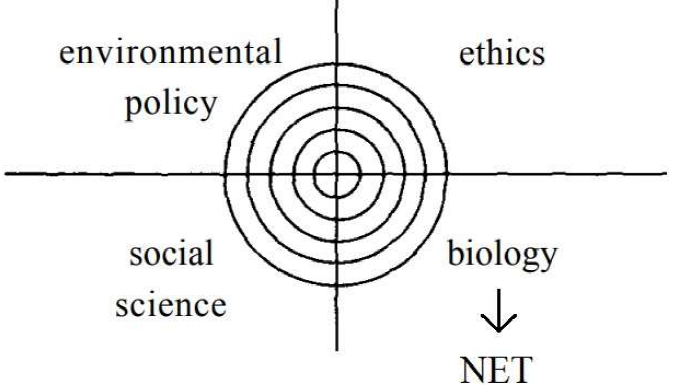
Asia Pacific Academy of Science Pte. Ltd. (APACSCI) specializes in international journal publishing. APACSCI adopts the open access publishing model and provides an important communication bridge for academic groups whose interest fields include engineering, technology, medicine, computer, mathematics, agriculture and forestry, and environment.

This study contributes to the empirical research on personal values theory within organizational settings. Through a case study of a group of scientists from China’s national research institution of agricultural sciences, this research examines the association between individuals’ value orientations of egoism, altruism, and the biosphere and their disciplinary backgrounds. According to the results of a questionnaire-based survey conducted among 678 scientists working within the Chinese Academy of Agricultural Sciences (CAAS), this study reveals a strong awareness of and concern for social values related to sustainability. It also shows that disciplinary background impacts individuals’ value orientation. Compared to natural scientists, social scientists at CAAS demonstrate a lower level of value orientation towards altruism and biosphere. The findings advocate moving away from simplistic messages that aim to promote employees’ pro-environmental behavior or from studies that focus solely on a narrow range of experiential factors. It concludes by emphasizing that sustainability transition efforts can promote the corporate greening process through a variety of managerial measures.
This study investigates how Virtual Reality (VR) tourism can help combat environmental degradation in Pakistan, including its potential to promote socio-economic growth in the country. Given the ever-increasing concerns governing the ecological degradation posed by physical tourism in a global landscape, VR tourism offers a sustainable alternative with much lesser impact on the environment and natural resources than on-site tourism. This study thus offers a conceptually-driven yet theoretically-supported and literature-backed EcoTech framework that integrates the external & internal factors affecting the adoption and effectiveness of virtual tourism activities & initiatives. To this end, the influence of external factors such as environmental concerns, environmental responsibility, pro-environmental behavior, eco-guilt and ecological impact on travel was theoretically evaluated to understand the individuals’ attitudes toward embracing virtual tourism. Moreover, the influence of age, gender, income, educational background and household size of the individuals were also considered as key control factors that could potentially affect their visit intentions from socio-economic & demographic viewpoints. Accordingly, this study advocates ‘Willingness-to-Forgo-Pleasure-of-In-situ-Tourism’ as a key enabler for promoting eco-friendly tourism and environmental sustainability as a whole. By and large, the suggested EcoTech framework offers some policy insights and guiding mechanisms for tourism industry stakeholders such as tour operators, government tourism departments including the eco-conscious travellers & tourists looking for cost-effective, environment-friendly and resource-efficient alternatives to on-site tourism.
This article explores the political and managerial aspects of financing ecosystem preservation in Ukraine under the influence of war, economic instability, and global climate and biodiversity challenges. Based on comparative analysis and international experience, particularly from the European Union, the authors assess the dynamics of state budget expenditures on the nature-protected fund of Ukraine from 2016 to 2025. The study applies systemic, economic, and decision-making methods, including cybernetic planning and the analytic hierarchy process (AHP), to identify optimal financing mechanisms. A comprehensive set of innovative tools is proposed—such as green bonds, sustainability-linked loans, blockchain monitoring, and public-private partnerships—to enhance financial resilience and ensure sustainable biodiversity conservation. The paper emphasizes the importance of private sector engagement, territorial communities, and international cooperation in forming a transparent, inclusive, and future-oriented financial system for nature protection. Particular attention is given to the role of ecosystem services in economic development and to mechanisms that integrate ecological protection with local economic strategies.
Adverse climate change effects, specifically droughts, floods, and dry spells, negatively affect agricultural production. The application of several machine learning methods assists with crop production prediction while factoring in these environmental variables. Machine learning is a crucial tool to ensure crop yield estimation, good agricultural planning practices, and effective decision-making, enabling better application of proposed interventions. Ecological intelligence signifies a paradigm shift toward balancing the competing goals of sustainability and productivity. This study aimed to demonstrate efficient agricultural productivity that addresses SDGs 12 (Responsible consumption and production), SDG 13 (Climate action), and SDG 15 (Life on land). The study was carried out in Lilongwe and Dowa districts, Malawi, and compared single and dual crop yields of farmers cultivating the same crop on similar hectarage, and their respective crop value, profitability, and sustainability. The study population comprised 62 (29.7%) male and 140 (70.3%) female farmers. A linear regression model analysis showed the importance and value of both crop yield and ecosystem resilience. The 80:20 train-test ratio split was used to produce good and effective output. Results showed that the dual crop yields of maize and beans were more profitable in comparison to both monocrop beans and maize plots. Male farmers had higher profits and yields than female farmers. These results show that sustainable practices can be incorporated into farming systems and could ensure both profitability and sustainability. However, future research will be done using intensive multiple-cropping and environmentally friendly methods that focus on consistent yields over an extended period.
Consilience of biodiversity and climate change is achievable through reduction to non-equilibrium thermodynamics. Subsequent construction supports a policy to decrease carbon emissions and species loss in capital-poor countries that are mega-diverse and carbon-rich. Incentives for conservation underpinned The Yasuní-ITT Initiative, whereby Ecuador sought payment not to drill for oil. The same logic holds for not opening highways in the Amazon. Consilience marries Living within Limits by Garrett Hardin with Half-Earth by E.O. Wilson. Artificial Intelligence facilitates persuasion of the Conference of the Parties to the United Nations Framework Convention on Climate Change and the United Nations Convention on Biological Diversity.

University of Lapland, Finland

Yaroslav Mudryi National Law University, Ukraine
-
-
-
EBSCO
-
HEINONLINE
-
Crossref
-
Publons
-
ROAD
-
WorldCat
-
J-Gate
-
Scilit
-
EuroPub
-
SSRN
-
Index of Copernicus
-
CiteFactor
-
Dimensions
-
DRJI
-
Zenodo
-
TrendMD
-
OpenAIRE
-
-


 Open Access
Open Access